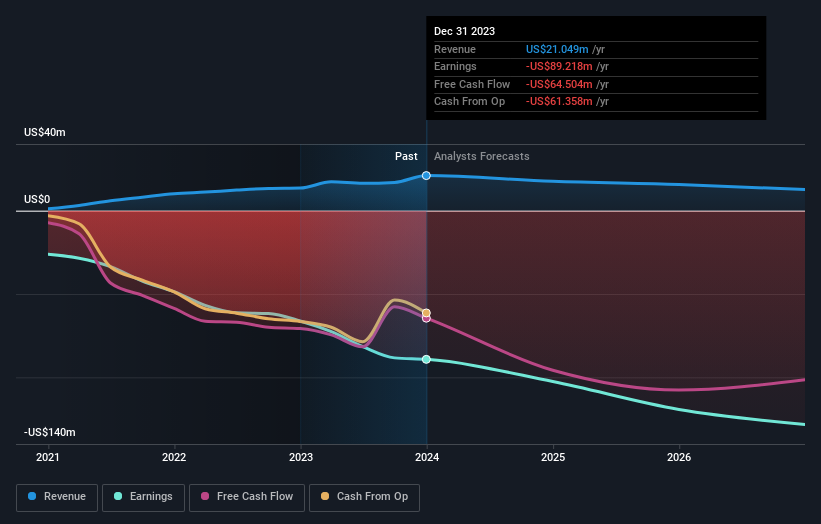Hedge funds investors control 50% of TScan Therapeutics, Inc. (NASDAQ:TCRX) and were rewarded last week after stock increased 16%
Key Insights
Significantly high institutional ownership implies TScan Therapeutics' stock price is sensitive to their trading actions
50% of the business is held by the top 5 shareholders
Using data from analyst forecasts alongside ownership research, one can better assess the future performance of a company
If you want to know who really controls TScan Therapeutics, Inc. (NASDAQ:TCRX), then you'll have to look at the makeup of its share registry. We can see that hedge funds own the lion's share in the company with 50% ownership. In other words, the group stands to gain the most (or lose the most) from their investment into the company.
Last week’s 16% gain means that hedge funds investors were on the positive end of the spectrum even as the company has shown strong longer-term trends. The one-year return on investment is currently 229% and last week's gain would have been more than welcomed.
Let's take a closer look to see what the different types of shareholders can tell us about TScan Therapeutics.
Check out our latest analysis for TScan Therapeutics
What Does The Institutional Ownership Tell Us About TScan Therapeutics?
Institutional investors commonly compare their own returns to the returns of a commonly followed index. So they generally do consider buying larger companies that are included in the relevant benchmark index.
As you can see, institutional investors have a fair amount of stake in TScan Therapeutics. This suggests some credibility amongst professional investors. But we can't rely on that fact alone since institutions make bad investments sometimes, just like everyone does. When multiple institutions own a stock, there's always a risk that they are in a 'crowded trade'. When such a trade goes wrong, multiple parties may compete to sell stock fast. This risk is higher in a company without a history of growth. You can see TScan Therapeutics' historic earnings and revenue below, but keep in mind there's always more to the story.
It would appear that 50% of TScan Therapeutics shares are controlled by hedge funds. That catches my attention because hedge funds sometimes try to influence management, or bring about changes that will create near term value for shareholders. Looking at our data, we can see that the largest shareholder is Baker Bros. Advisors LP with 15% of shares outstanding. In comparison, the second and third largest shareholders hold about 11% and 10% of the stock.
To make our study more interesting, we found that the top 5 shareholders control more than half of the company which implies that this group has considerable sway over the company's decision-making.
While it makes sense to study institutional ownership data for a company, it also makes sense to study analyst sentiments to know which way the wind is blowing. Quite a few analysts cover the stock, so you could look into forecast growth quite easily.
Insider Ownership Of TScan Therapeutics
The definition of an insider can differ slightly between different countries, but members of the board of directors always count. The company management answer to the board and the latter should represent the interests of shareholders. Notably, sometimes top-level managers are on the board themselves.
I generally consider insider ownership to be a good thing. However, on some occasions it makes it more difficult for other shareholders to hold the board accountable for decisions.
Our most recent data indicates that insiders own less than 1% of TScan Therapeutics, Inc.. We do note, however, it is possible insiders have an indirect interest through a private company or other corporate structure. It appears that the board holds about US$3.4m worth of stock. This compares to a market capitalization of US$384m. Many tend to prefer to see a board with bigger shareholdings. A good next step might be to take a look at this free summary of insider buying and selling.
General Public Ownership
With a 14% ownership, the general public, mostly comprising of individual investors, have some degree of sway over TScan Therapeutics. While this group can't necessarily call the shots, it can certainly have a real influence on how the company is run.
Private Company Ownership
We can see that Private Companies own 4.6%, of the shares on issue. Private companies may be related parties. Sometimes insiders have an interest in a public company through a holding in a private company, rather than in their own capacity as an individual. While it's hard to draw any broad stroke conclusions, it is worth noting as an area for further research.
Next Steps:
It's always worth thinking about the different groups who own shares in a company. But to understand TScan Therapeutics better, we need to consider many other factors. Case in point: We've spotted 3 warning signs for TScan Therapeutics you should be aware of, and 2 of them make us uncomfortable.
Ultimately the future is most important. You can access this free report on analyst forecasts for the company.
NB: Figures in this article are calculated using data from the last twelve months, which refer to the 12-month period ending on the last date of the month the financial statement is dated. This may not be consistent with full year annual report figures.
Have feedback on this article? Concerned about the content? Get in touch with us directly. Alternatively, email editorial-team (at) simplywallst.com.
This article by Simply Wall St is general in nature. We provide commentary based on historical data and analyst forecasts only using an unbiased methodology and our articles are not intended to be financial advice. It does not constitute a recommendation to buy or sell any stock, and does not take account of your objectives, or your financial situation. We aim to bring you long-term focused analysis driven by fundamental data. Note that our analysis may not factor in the latest price-sensitive company announcements or qualitative material. Simply Wall St has no position in any stocks mentioned.


